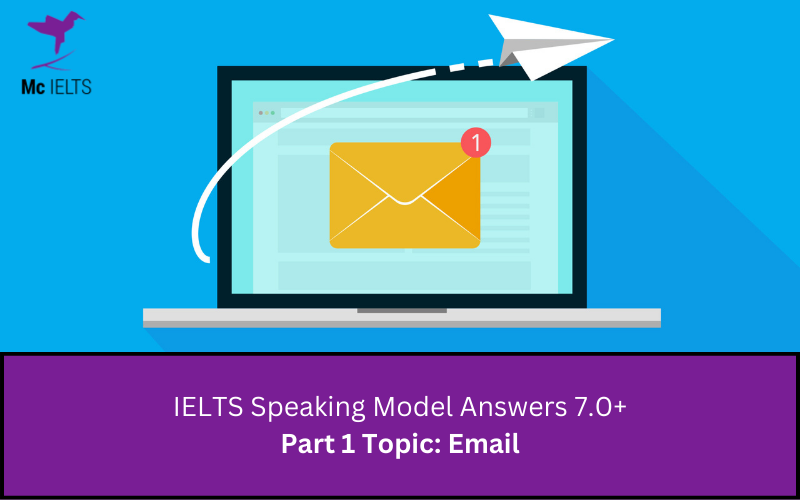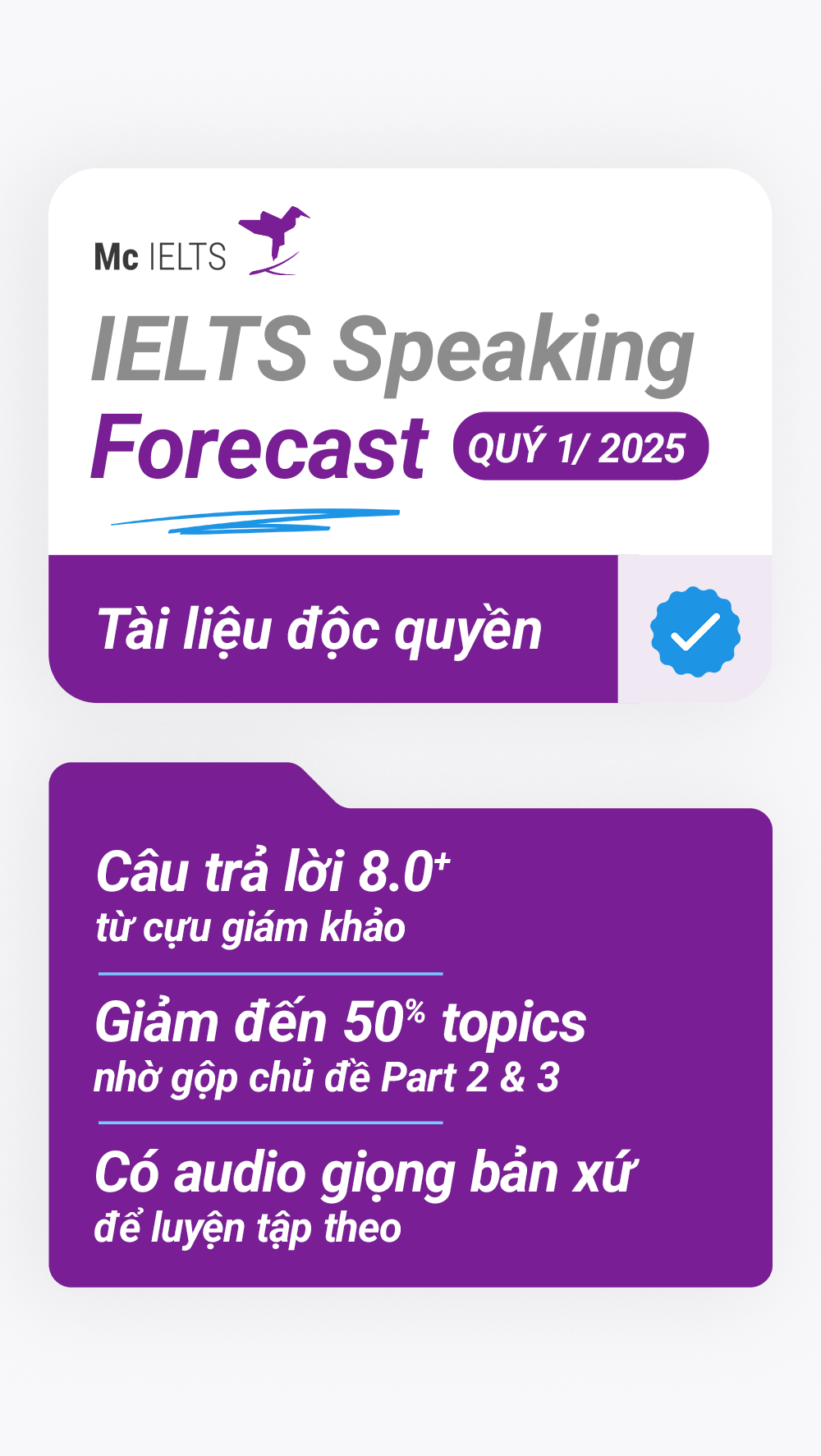IELTS Speaking Part 1 Topic: Email
 13/12/2023
13/12/2023
 Tác giả : MC IELTS
Tác giả : MC IELTS
IELTS Speaking Part 1: Topic Email

Topic Speaking Reading cũng là IELTS Topic thường xuyên xuất hiện ở phần Speaking Part 1. Cùng Trung tâm học IELTS Mc IELTS tham khảo một số câu trả lời mẫu Band 7+ dưới đây nhé cả nhà.
Speaking Model Answers
1. How often do you use email?
I would be lying if I said that my life can always go on well without email. Indeed, I have seven email accounts in total, and I never fail to check them four to six times a day. As a language teacher, a tutor, and a teaching assistant, I use email mostly to exchange information with my students and archive folders, documents, and files that contain all my teaching and course materials.
2. What do most people in your country use email for?
In Vietnam, email is used for a variety of both work-related and personal purposes. Businesses and companies, for example, make immediate responses to their customers’ inquiries and requests via email. Individual users take it as a tool to send and receive different forms of attachments including photos, short videos, and files or documents besides composing messages. A large number of netizens these days choose to keep themselves updated on the latest news from across the globe on their email accounts and even use them to make online purchases.
3. What are the advantages of email?
Since it came into existence, email has brought countless conveniences to the entire world. Information sharing has been much easier, faster, and more convenient than ever before. A single mouseclick would get an electronic letter or message with seemingly limitless words and a series of attachments to reach the person it is intended for in barely seconds, no matter where he appears to be on Earth. Surprisingly, it takes neither a cent nor an ounce of energy to perform such a simple task. Email obviously keeps its users in touch with one another everywhere anytime. It further provides them with instant access to both domestic and international news as well as to online shopping.
4. Are there any disadvantages?
Despite how much people have been benefiting from email so far, its drawbacks can easily be seen. Without a computer, a smartphone, a tablet, or any other electronic device and an accessible Internet connection, email is of no use at all. It might also turn out to be a widespread source of computer viruses and disturbing spams.
5. Do you think that email will replace letter-writing?
From my point of view, traditional letters can never be replaced by email. They feature a formal method of communication that explicitly speaks the writer’s heart and mind to the recipient as his true emotions, feelings, thoughts, and actual intention are all expressed in every word he decides to put down. As a result, the total amount of time someone devotes to a handwritten letter partially indicates how much sincerity is contained in it.
Vocabulary
=> go on /gəʊ ɒn/: tiếp tục diễn ra
E.g: Sarah is no longer going on with Kyle being dead.
=> indeed /ɪnˈdiːd/: thật sự thì
E.g: A sailor’s life is indeed a hard one.
=> archive /ˈɑːkaɪv/: lưu trữ
E.g: We suggest you create a free account and archive the articles you wish to save.
=> work-related /wɜrk-rɪˈleɪtɪd/: liên quan tới công việc
E.g: Students’ work-related experiences are much less intensive than in an apprenticeship program.
=> inquiry /ɪnˈkwaɪri/: sự thắc mắc, dò hỏi thông tin, thẩm vấn
E.g: These are questions that lie outside the purview of your inquiry.
=> request /rɪˈkwɛst/: yêu cầu
E.g: They have made an urgent request for international aid.
=> individual /ˌɪndəˈvɪʤəwəl/: cá nhân riêng lẻ
E.g: About half this amount comes from individual donors and bequests.
=> attachment /əˈtæʧmənt/: dữ liệu đính kèm
E.g: I’ll email my report to you as an attachment.
=> compose /kəmˈpoʊz/: soạn, biên soạn
E.g: They compose the songs on the spot.
=> netizen /ˈnet̬.ə.zən/: cư dân mạng
E.g: We look at how the new generation of commercial web browsers can help netizens surf the world.
=> make a purchase /meɪk ə ˈpɜrʧəs/: thực hiện giao dịch mua bán
E.g: Are you ready to make a purchase?
=> come into existence /kʌm ˈɪntu ɛgˈzɪstəns/: trở nên tồn tại
E.g: “When did the human world come into existence?” she asked.
=> countless /ˈkaʊntləs/: vô số (nhiều đến nỗi không thể đếm hết được)
E.g: In this way, she learns countless new expressions without any apparent effort.
=> information sharing (information exchange) /ˌɪnfərˈmeɪʃən ˈʃɛrɪŋ/: sự trao đổi thông tin
E.g: Some of the chiefs also urged improved information sharing between schools and law enforcement officials.
=> mouseclick /maʊs klɪk/: cái nhấp chuột
E.g: She told me that she was hearing several mouseclicks in the office.
=> seemingly /ˈsimɪŋli/: tưởng như, có vẻ như
E.g: His strikes were hard and fast and seemingly from every direction.
=> limitless /ˈlɪmətləs/: vô hạn
E.g: The options for buying table lamps are nearly limitless.
=> obviously /ˈɑbviəsli/: rõ ràng
E.g: She obviously wants you to stay.
=> keep/stay in touch /kip ɪn tʌʧ/: giữ liên lạc
E.g: Facebook lets people keep in touch with their beloved ones.
=> drawback /ˈdrɔːbæk/: điều kiện bất lợi, nhược điểm
E.g: It’s a great city – the only drawback is the weather.
=> (be) + of no use /ɒv nəʊ juːz/: vô ích
E.g: All our persuasion was of no use.
=> widespread /ˈwaɪdsprɛd/: lan rộng, lan tỏa
E.g: There is widespread discrimination against doctors of Asian origin.
=> disturbing /dɪˈstɜrbɪŋ/: gây phiền toái
E.g: Disturbing thoughts crowded into my mind.
=> spam /spæm/: thư rác
E.g: Spam is a great advertising medium for scams and products that don’t have to answer to any form of customer protection or review.
=> formal /ˈfɔrməl/: hợp thức, đúng lệ
E.g: The letter is written in a formal style.
=> explicitly /ɪkˈsplɪsətli/: một cách minh bạch, thẳng thắn, dứt khoát, rõ ràng
E.g: The plan does not explicitly endorse the private ownership of land.
=> recipient /rəˈsɪpiənt/: người lãnh, người nhận
E.g: Gary believes that I should be the recipient of his special knowledge, and in my present state of mind, I am willing.
=> put down /pʊt daʊn/: viết ra (cảm nhận/suy nghĩ/ý tưởng)
E.g: All of a sudden, his mind went blank and had nothing to put down the answer sheet.
=> devote /dɪˈvoʊt/: cống hiến, dâng cho, dành hết lòng cho
E.g: I could only devote two hours a day to work on the project.
=> partially /ˈpɑrʃəli/: một phần nào
E.g: 34% of people in the survey were at least partially dependent on public transport.
=> indicate /ˈɪndəˌkeɪt/: biểu thị, thể hiện, tỏ ra
E.g: Road markings indicate where you can stop.
=> sincerity /sɪnˈsɛrəti/: lòng chân thành
E.g: The sincerity of his beliefs is unquestionable.
- Các Topic trong IELTS Speaking
- IELTS Speaking Part 1 Reading
- Các lỗi sai ngớ ngẩn của thí sinh khi thi IELTS Speaking
Nhận lộ trình IELTS TỐI ƯU theo yêu cầu
















